
The Bible does not explicitly mention masturbation, either as an endorsement or in condemnation. Instead, Christians look to broader biblical principles—such as lust, sexual purity, self-control, conscience, and God’s design for sex—to think through the issue.
Because Scripture does not directly address masturbation by name, faithful Christians have reached different conclusions based on how they apply these principles. There is no single verse that settles the question on its own.
If you’re wondering whether masturbation is sinful in your own life, you’re not alone. Many believers wrestle with this question sincerely and quietly.
Below, I’ll explain what Scripture clearly says, what it does not say, and how to think through this issue carefully so you can arrive at a spiritually honest conclusion. No matter what, there are still tremendous benefits of not masturbating, regardless of how you feel after this discussion.
Bible translations used:
Scripture quotations in this article are primarily taken from the King James Version (KJV) for consistency. In select cases, the New International Version (NIV) is referenced for clarity or comparison of wording.
Why This Question Is Hard (and Why Christians Disagree)

This question is difficult in part because the Bible is not written as a manual for modern sexuality. Scripture tends to address principles of desire, self-control, and holiness, rather than naming every specific behavior using contemporary language.
Another challenge is how the word masturbation is used. While the definition itself is straightforward, people often mean very different things by it. For some, it refers simply to sexual self-pleasuring. For others, it is inseparable from sexual fantasy, pornography, or a habitual way of coping with stress, loneliness, or anxiety.
Those differences matter, but they are often flattened into a single term. As a result, Christians may appear to disagree about masturbation when they are actually responding to different underlying behaviors.
Beneath all of this is a fear many believers share:
If this is condemned, am I living in sin for doing something I’ve been told is natural and common?
When Scripture is read through different lenses and applied to different experiences, sincere Christians can read the same passages and arrive at different conclusions, sometimes with equal conviction.
To get to the heart of this matter, let’s look at exactly what the Bible says about masturbation.
Further reading: Is Masturbation A Sin? What The Bible And Christian Teachings Say
What the Bible Does and Does Not Say About Masturbation

The Bible does not contain any verse that names masturbation or directly forbids it. There is no command that says, “Thou shall not masturbate,” nor a passage that clearly addresses the act as we understand it today.
Because of this, Christians need to be careful about “proof-texting,” the practice of pulling isolated verses out of context and forcing them to answer a question they were not written to address.
For example, Jesus’s words “Do not judge” in Matthew 7:1 are sometimes quoted to suggest that Christians should never make moral distinctions or evaluate behavior at all. Read in isolation, the phrase appears to forbid judgment entirely.
In context, however, Jesus is addressing hypocritical judgment—condemning others while ignoring one’s own faults. He immediately follows this warning with the image of removing the plank from your own eye so that you can see clearly to help your brother.
Far from abolishing discernment, the passage assumes it, but insists it be practiced with humility and self-examination.
When the opening line is lifted out of that context, the meaning shifts. A warning against hypocrisy becomes a blanket prohibition on moral reasoning. This is a classic example of how isolating a phrase from its surrounding argument can flatten Scripture’s intent rather than clarify it.
And when it comes to masturbation, many Christians are guilty of this same type of proof-texting.
Further reading: 32 Bible Verses About Lust And Masturbation—What Scripture Really Teaches About Desire and Self Control
What the Bible Does Speak To (Principles That Apply)
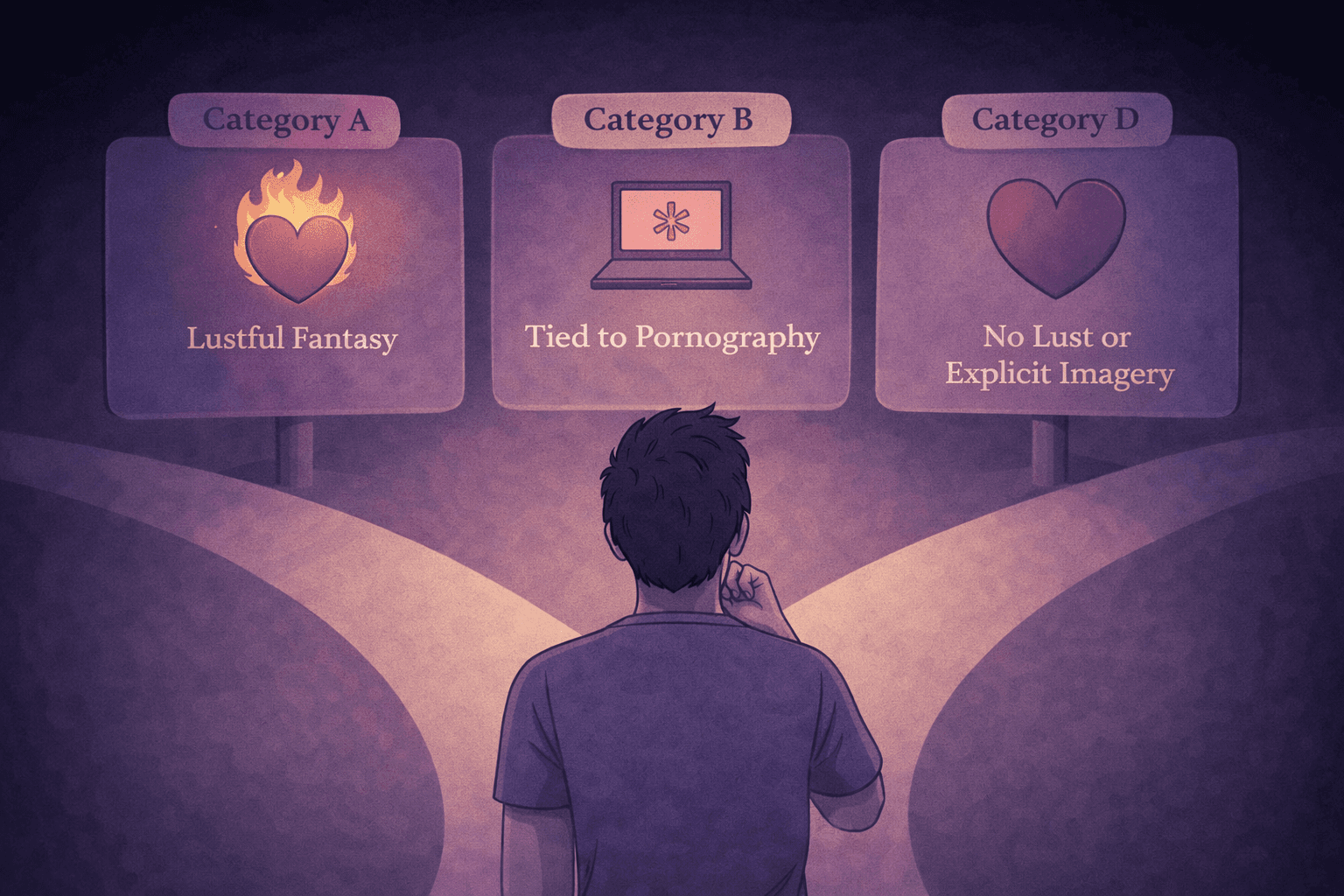
Although masturbation itself is not mentioned, Scripture consistently addresses the motivations, desires, and outcomes surrounding sexual behavior, and that includes masturbation. These are the principles Christians apply when thinking through this issue:
Lust and the heart
“You have heard that it was said, ‘You shall not commit adultery.” But I tell you that anyone who looks at a woman lustfully has already committed adultery with her in his heart.”
-Matthew 5:27–28.
Jesus teaches that sin is not only about outward actions but also about inward desire.
Sexual immorality and holiness
“It is God’s will that you should be sanctified: that you should avoid sexual immorality; that each of you should learn to control your own body[a] in a way that is holy and honorable, not in passionate lust like the pagans, who do not know God.”
-1 Thessalonians 4:3–5
Believers are called to pursue holiness and honor God with their bodies.
Self-control and mastery over desires
“But the fruit of the Spirit is love, joy, peace, forbearance, kindness, goodness, faithfulness, gentleness and self-control. Against such things, there is no law.”
-Galatians 5:22–23
Self-control is presented as a fruit of the Spirit and a marker of spiritual maturity.
Stewardship of the body
“Flee from sexual immorality. All other sins a person commits are outside the body, but whoever sins sexually, sins against their own body. Do you not know that your bodies are temples of the Holy Spirit, who is in you, whom you have received from God? You are not your own; you were bought at a price. Therefore, honor God with your bodies.”
-1 Corinthians 6:18–20
The body is described as belonging to God, not merely as a tool for self-gratification.
Summary of the Biblical Principles that apply to masturbation
In short, the Bible does not give a direct command about masturbation, which means it cannot be settled by isolating a single verse or phrase. When Scripture is read in context, it consistently resists simplistic proof-texting and instead calls believers to discernment shaped by humility, self-examination, and integrity.
While masturbation itself is not named, the Bible clearly speaks to the heart behind sexual behavior—addressing lust, holiness, self-control, and stewardship of the body. These principles don’t offer a one-line answer, but they do provide a clear framework for thinking honestly and faithfully about how our desires and actions align with God’s intent.
Further reading: Does God Forgive Lust—Yes, Even When You've Failed Repeatedly
Is Masturbation a Sin?
Because the Bible does not give a direct command about masturbation, it helps to ask the kinds of questions Scripture itself consistently asks when evaluating human behavior. This moves the discussion away from slogans and toward discernment.
Start With Two Questions Scripture Does Ask
Rather than beginning with “Is this allowed?”, the Bible repeatedly pushes us to ask deeper questions:
What’s happening in the heart?
Is the act driven by lust, fantasy, or coveting—especially desire directed toward someone who is not your spouse? Scripture treats the inner life as morally significant, not morally neutral.What fruit is it producing?
Does this behavior lead to peace, self-control, and integrity—or to bondage, shame, secrecy, and loss of control? The Bible regularly evaluates practices by the kind of fruit they bear over time.
These two questions—heart and fruit—form the backbone of a biblical framework.
A Simple, Non-Dogmatic Classification
When Christians talk past one another on this topic, it’s often because they’re talking about different categories without naming them. Clarifying those categories helps bring the disagreement into focus.
Category A: Masturbation fueled by lust or sexual fantasy about someone who is not your spouse
This typically involves mentally rehearsing or indulging desire in ways Scripture consistently warns against.
Category B: Masturbation tied to pornography
This combines sexual fantasy with explicit imagery and is widely regarded by Christians as spiritually damaging and incompatible with biblical sexual ethics.
Category C: Habitual or compulsive masturbation used to numb stress, anxiety, loneliness, or emotional pain
Here, the issue is not only sexual desire but loss of self-control and the use of the behavior as an emotional escape.
Category D: Masturbation without pornography or explicit fantasy
This is the most debated category and the one Scripture addresses least directly.
Where Most Christians Land
There is broad agreement among Christians that Categories A–C are spiritually harmful, because they involve lust, pornography, loss of self-control, or patterns of secrecy and bondage.
Category D is where faithful Christians disagree. Some see it as incompatible with God’s design for sexuality; others view it as a matter of conscience when lust and compulsion are absent. Because Scripture does not speak directly here, wisdom, humility, and honesty before God are essential.
Rather than forcing a one-word answer, this framework helps clarify why different conclusions exist—and how to evaluate your own situation faithfully.
Further reading: Is It A Sin To Explore Your Body? What The Bible Actually Teaches
Lust vs. Masturbation: Why Jesus’s Teaching Matters Here

Any serious Christian discussion of masturbation eventually runs into a deeper issue: lust. Jesus didn’t reduce sin to outward behavior alone; He focused on what’s happening internally.
What is the biblical idea of "lust"
In Scripture, lust is not the same as noticing someone is attractive. Attraction can be involuntary. Lust, however, goes further—it involves coveting, mentally dwelling on someone, consuming them in the imagination, and reducing them to an object for personal gratification.
Jesus makes this distinction explicit when He teaches that sinful desire begins in the heart, not merely in physical action (Matthew 5:27–28).
This matters because many masturbation patterns are not purely physical. They rely heavily on mental imagery, fantasy, or rehearsal, which Scripture treats as morally significant, not neutral.
The Real Question: What Are You Doing With Your Mind?
The issue, biblically speaking, is not only what your body is doing but what your mind is being trained to do.
If your mind is repeatedly rehearsing sexual scenarios that involve coveting or objectifying others, the act itself cannot be separated from that inward posture.
Over time, training your attention toward fantasy and objectification reshapes desire, making it harder to pursue purity, self-control, and genuine intimacy.
Jesus’s teaching presses the question deeper than behavior management. It asks whether a practice is cultivating holiness—or slowly bending desire in the opposite direction.
Two people can perform the same outward action, yet differ morally because of intent. Giving money can be generosity or self-promotion. In the same way, sexual behavior can differ in moral weight based on what is happening internally. Scripture consistently evaluates the heart first.
Further reading: Is It A Sin To Look At A Woman's Body? The Biblical Line Between Lust And Attraction
Porn Changes the Moral Equation (and the Spiritual Consequences)
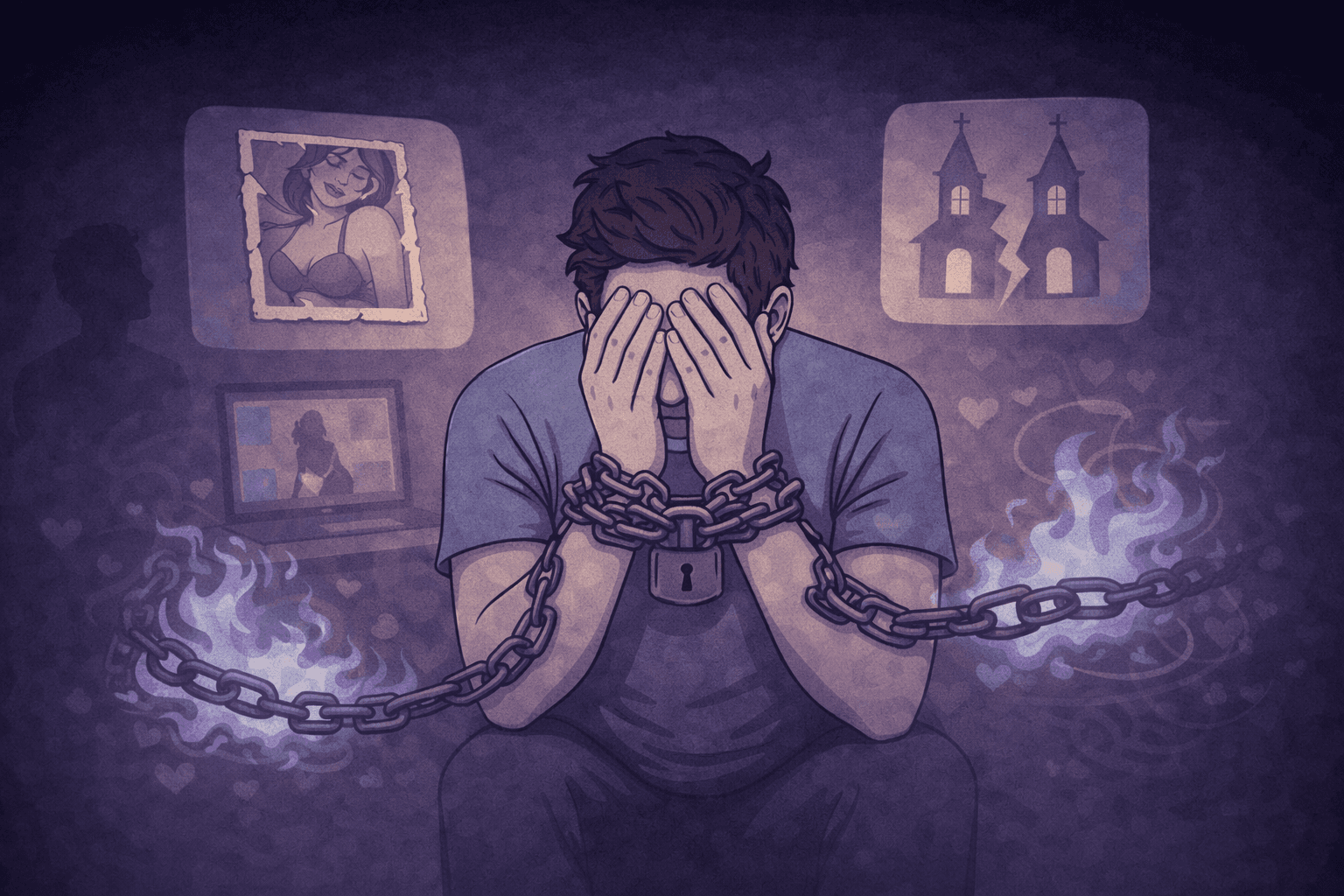
For many Christians, the masturbation debate becomes far clearer once pornography enters the picture. Porn doesn’t just accompany sexual behavior—it fundamentally reshapes it, both spiritually and psychologically.
Why Pornography Is Uniquely Corrosive in Christian Ethics
From a biblical perspective, pornography introduces problems that go beyond physical release:
It exploits bodies made in God’s image.
Pornography turns people into products and consumption objects, flattening human dignity in a way Scripture consistently opposesIt builds patterns of secrecy and a double life.
Porn thrives in isolation, hidden behavior, and compartmentalization—habits that erode integrity and spiritual openness.
It trains arousal toward novelty and escalation.
Instead of uniting desire with commitment and love, porn conditions the mind to chase stimulation, variety, and intensity, often weakening self-control over time.
Because of these effects, most Christian traditions are clear that pornography itself is incompatible with biblical sexual ethics.
Further reading: Is Watching Porn A Sin? Understanding The Question Christians Are Really Asking
If Porn Is Part of Your Routine, Address Porn First
Many people try to “solve masturbation” while continuing to use pornography. This almost never works. Porn is the gasoline; masturbation is the match. As long as the fuel remains, the behavior it feeds will keep reigniting.
If porn is involved, clarity often comes quickly: addressing pornography is the first and most important step, regardless of where you land on masturbation in isolation.
A simple starting checklist:
Remove triggers. Identify times, places, and devices where temptation is strongest.
Add friction. Make access inconvenient, not effortless.
Replace the coping strategy. Stress, loneliness, and boredom need healthier outlets.
Build accountability. Bring the struggle into the light with someone you trust.
When pornography is removed from the equation, the conversation about masturbation becomes more honest—and far less confusing.
Further reading: Will I Go To Hell For Watching Porn? A Clear Christian Answer
What About Genesis 38 and Onan?

This passage comes up so often in discussions about masturbation that it’s important to address it directly and carefully.
In Genesis 38, Onan is condemned for deliberately refusing to fulfill his obligation to provide offspring for his deceased brother. The text emphasizes intentional disobedience, deception, and exploitation of the situation for personal gain, not a general statement about sexual behavior in isolation.
Because of this, many biblical scholars and theologians argue that the passage is about withholding offspring and violating a covenantal duty, not about masturbation as a standalone act. That’s why even many Christian teachers who believe masturbation is sinful do not rely on Onan as their primary evidence.
As a result, this passage is often cited—but it doesn’t function as a clean proof-text either way.
Don’t build your entire view on Onan.
Further reading: Is Touching Yourself A Mortal Sin—Does God Forgive This Struggle
“But I’m Married…” “But I’m Single…” Common Scenarios Christians Ask About
When people ask what the Bible says about masturbation, they’re often really asking how it applies to their specific situation. Scripture doesn’t give one-size-fits-all answers, but it does offer wisdom for different seasons of life.
If You’re Single and Trying to Walk in Purity
For single Christians, the goal is not the impossible standard of never experiencing sexual desire. Desire itself is not sinful. The biblical aim is holiness paired with self-control, not repression.
If masturbation is regularly feeding lust, sexual fantasy, or patterns that make it harder to pursue purity, then it isn’t helping you become more whole. It’s shaping desire in the opposite direction.
Over time, what you practice trains what you want. Scripture consistently calls believers to practices that strengthen self-mastery, not weaken it.
If You’re Married
Marriage introduces an important distinction: where sexual desire is directed.
Desire oriented toward your spouse fits within the covenant of marriage. Sexual fantasy or habitual desire directed outside that covenant does not. Masturbation becomes spiritually concerning when it:
Replaces intimacy instead of supporting it
Becomes a private outlet that withdraws energy from the marital relationship
Is used to avoid difficult conversations, unmet needs, or relational repair
In those cases, the issue is less about the act itself and more about what it is displacing.
If You’re Dealing With Intrusive Thoughts or Trauma
It’s important to say this clearly: not every unwanted sexual thought is chosen lust. Intrusive thoughts, trauma responses, and conditioned mental imagery can occur without consent or desire.
In these situations, guilt and self-condemnation are rarely helpful.
Scripture makes room for human weakness and calls for compassion alongside accountability. Even the strictest Christian stance on the sinfulness of masturbation makes allowances for trauma.
Seeking pastoral care, trusted counsel, or professional therapy can be a faithful step—not a spiritual failure—especially when past experiences are shaping present struggles.
The Conscience Principle: What If I Feel Convicted?

When Scripture does not give a direct command, the Bible repeatedly points believers toward conscience, wisdom, and integrity before God. That’s why how this issue affects you internally matters.
Conviction vs. Condemnation
There is an important difference between conviction and condemnation.
Conviction draws you toward God. It brings things into the light, encourages honesty, and leads to growth, repentance, and renewed clarity.
Condemnation pushes you away from God. It fuels hiding, despair, self-loathing, and the sense that you are beyond help.
Biblically, conviction is meant to heal and restore; condemnation isolates and crushes. If your response to this struggle is driving you deeper into secrecy or hopelessness, something has gone wrong.
A Romans 14–Style Way of Thinking (Without the Jargon)
Scripture recognizes that not every moral question fits into a simple rule. Some issues require discernment shaped by conscience and faith.
Three guiding ideas apply here:
If you can’t do it in faith, don’t do it. Acting against your conscience erodes integrity, even when others disagree.
What God has not commanded, you should not treat casually. Freedom is not the same as carelessness.
If it masters you, it’s not freedom. Anything that controls you spiritually is no longer neutral.
This approach doesn’t lower the moral bar—it personalizes responsibility.
Three Signs Masturbation Is Becoming Spiritually Harmful
Regardless of where you land doctrinally, Scripture gives clear warning signs:
Secrecy and isolation. The behavior pushes you into hiding or double life.
Loss of control. You find yourself saying, “I don’t want to do this, but I keep doing it.”
Spiritual and relational interference. It disrupts prayer, relationships, work, joy, or your sense of peace before God.
When those signs are present, the question is no longer theoretical. It’s pastoral—and it deserves an honest, compassionate response.
Further reading: Will God Forgive Me for Watching Bad Things? Yes—Even After Repeated Failure
What To Do If You Want to Stop (Practical Steps That Actually Help)
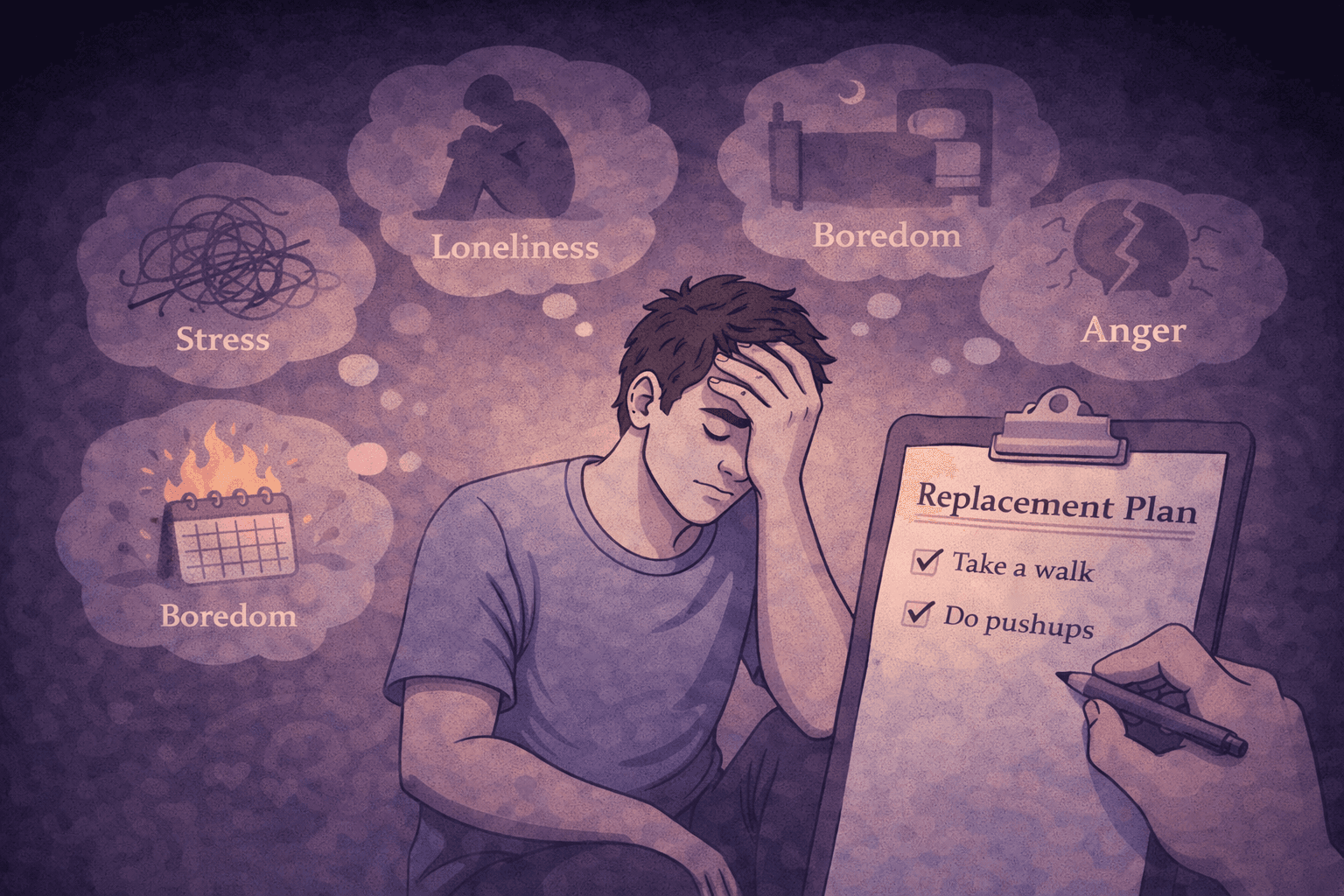
If you’ve decided that masturbation—or the patterns surrounding it—is not helping you live with integrity before God, the goal isn’t sheer willpower. Lasting change comes from understanding what the behavior is doing for you and replacing it with something better.
Identify the “Why” (Not Just the Behavior)
Most people don’t turn to masturbation because of overwhelming sexual desire alone. It often functions as a way to manage something else:
Stress or mental overload
Loneliness or emotional disconnection
Boredom or lack of structure
Anger or frustration
Insomnia or difficulty winding down
Anxiety or emotional numbness
If you only attack the behavior without addressing the need it’s meeting, the habit usually resurfaces in another form. The aim is to replace the function, not just suppress the habit.
Build a Replacement Plan (Simple and Doable)
Change sticks when it’s concrete and follows a plan. One of the most effective approaches is to pre-decide your response.
“When I feel X, I will do Y.”
Example: When I feel stressed late at night, I’ll take a 10-minute walk or do pushups.Use the 10-minute rule (urge surfing).
Urges rise and fall like waves. Delay the behavior for ten minutes and redirect your attention. Most urges weaken if they aren’t immediately acted on.Practice phone hygiene.
Nighttime, bathrooms, and bed are common trigger zones. Charge your phone outside the bedroom, remove apps or browsers that lead to temptation, and create physical distance between impulse and access.
Small environmental changes often succeed where motivation fails.
Accountability That Works (Without the Weirdness)
Accountability isn’t about surveillance—it’s about honesty.
Confess to a trusted person.
Choose someone mature, discreet, and non-judgmental. Bringing the struggle into the light weakens its grip.Seek pastoral counsel when appropriate.
A pastor or spiritual mentor can help you think clearly without shame or fear.Use software as support, not a savior.
Filters and blockers can be helpful, but they don’t replace inner resolve or community. Tools assist change; they don’t create it.
If You Relapse
Relapse does not erase progress—but shame can.
Don’t spiral into self-condemnation.
Review what triggered the lapse.
Adjust your environment or plan accordingly.
Re-commit quickly instead of quitting entirely.
Growth is rarely linear. What matters is how fast you return to clarity and intention.
A Simple 30-Day Reset (Optional but Effective)
For many people, a short, structured reset creates momentum:
Week 1: Remove obvious triggers and add friction
Week 2: Replace unhealthy coping routines with healthier outlets
Week 3: Rebuild sleep, exercise, and daily rhythm
Week 4: Strengthen community and set long-term safeguards
The aim isn’t perfection—it’s reclaiming self-control, clarity, and peace before God.
Further reading: Will I Go To Hell For Masturbating? A Calm Biblical Answer For Christians
FAQs On Masturbation And The Bible
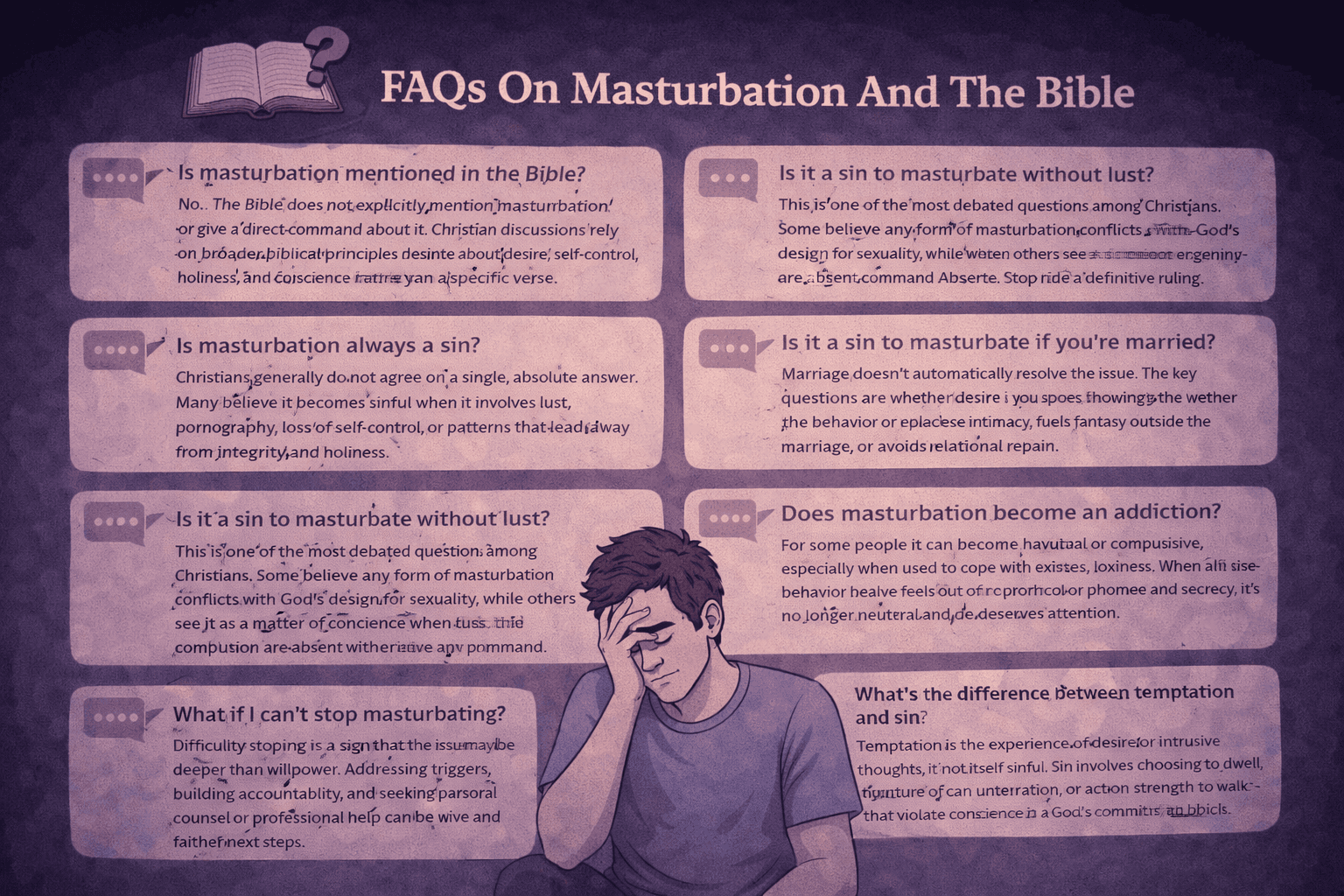
Is masturbation mentioned in the Bible?
No. The Bible does not explicitly mention masturbation or give a direct command about it. Christian discussions rely on broader biblical principles about desire, self-control, holiness, and conscience rather than a specific verse.
Is masturbation always a sin?
Christians generally do not agree on a single, absolute answer. Many believe it becomes sinful when it involves lust, pornography, loss of self-control, or patterns that lead away from integrity and holiness.
Is it a sin to masturbate without lust?
This is one of the most debated questions among Christians. Some believe any form of masturbation conflicts with God’s design for sexuality, while others see it as a matter of conscience when lust and compulsion are absent. Scripture does not give a definitive ruling.
Is it a sin to masturbate if you’re married?
Marriage doesn’t automatically resolve the issue. The key questions are whether desire is directed toward one’s spouse and whether the behavior replaces intimacy, fuels fantasy outside the marriage, or avoids relational repair.
Does masturbation become an addiction?
For some people, it can become habitual or compulsive, especially when used to cope with stress, anxiety, or loneliness. When a behavior feels out of control or produces shame and secrecy, it’s no longer neutral and deserves attention.
What if I can’t stop masturbating?
Difficulty stopping is a sign that the issue may be deeper than willpower. Addressing triggers, building accountability, and seeking pastoral counsel or professional help can be wise and faithful next steps.
What’s the difference between temptation and sin?
Temptation is the experience of desire or intrusive thoughts; it is not itself sinful. Sin involves choosing to dwell on, nurture, or act on temptation in ways that violate conscience or God’s commands.
What should I pray for if I struggle with this?
Many Christians find it helpful to pray for clarity, self-control, honesty before God, and a renewed heart—not just for the behavior to stop. Asking for wisdom to understand your desires and strength to walk in integrity is a biblical starting point.
So where does the Bible stand on masturbation?
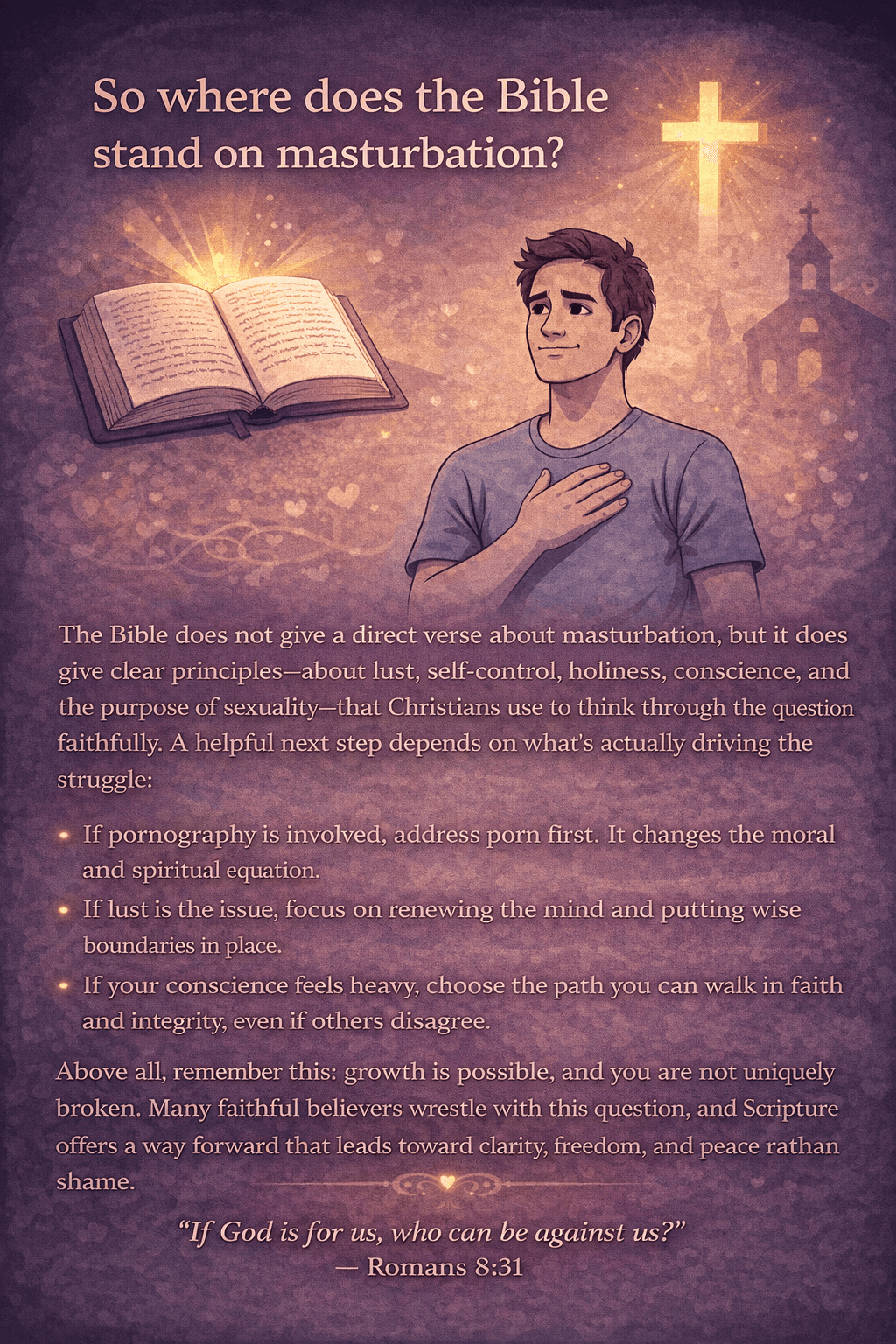
The Bible does not give a direct verse about masturbation, but it does give clear principles—about lust, self-control, holiness, conscience, and the purpose of sexuality—that Christians use to think through the question faithfully. That means the issue is not answered by slogans or fear, but by honest self-examination before God.
A helpful next step depends on what’s actually driving the struggle:
If pornography is involved, address porn first. It changes the moral and spiritual equation.
If lust is the issue, focus on renewing the mind and putting wise boundaries in place.
If your conscience feels heavy, choose the path you can walk in faith and integrity, even if others disagree.
Above all, remember this: growth is possible, and you are not uniquely broken. Many faithful believers wrestle with this question, and Scripture offers a way forward that leads toward clarity, freedom, and peace rather than shame.
If you’re struggling with masturbation or feel conflicted about it, know that you’re not alone. Seeking help through prayer, support groups, or counseling can lead to healing and freedom. At Relay, we’re here to support you on your journey to living a life that honors your beliefs and brings you peace.
Remember what the Bible says in Romans 8:31. “If God be for us, who can be against us?” Isn’t that neat?! You’re on the same team as someone who is literally invincible. God has promised to help you.
Changing your behavior isn’t easy. Masturbation does things to the brain that can take awhile to unlearn. But if you have God on your side, no matter how hard quitting may seem, it is doable.




